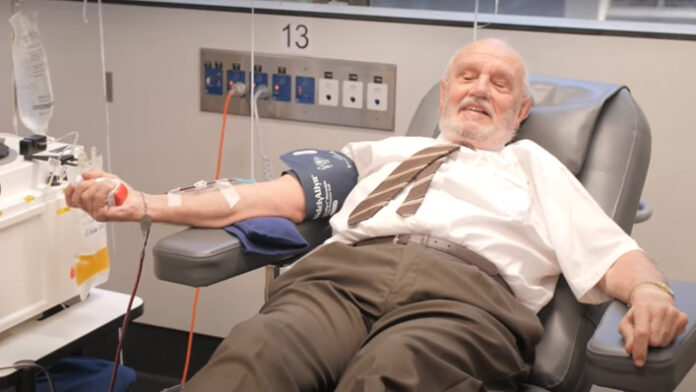James Harrison is not just an ordinary Australian; he is a lifesaver on an epic scale, known globally as the “Man with the Golden Arm.” Born in 1936, Harrison’s medical journey began at age 14, when he underwent a major chest operation, receiving 13 liters of blood. Grateful for this life-saving donation, he vowed to become a blood donor himself. Little did he know, his blood contained a rare and precious antibody, a component that would lead to revolutionary medical treatments for Rhesus disease, affecting pregnant women and their unborn children. Over the span of 60 years, Harrison made over 1,100 plasma donations, each one contributing to the safety and health of mothers and their babies worldwide.
The Significance of Rhesus Disease and Plasma Donation
Rhesus disease, also known as Rh disease, occurs when there is a compatibility issue between the blood types of a pregnant mother and her unborn child. Specifically, problems arise when the mother’s blood is Rh-negative, and her baby’s is Rh-positive, potentially leading to severe anemia and other serious health issues in the newborn. Before the development of treatments using Anti-D immunoglobulin, largely derived from plasma like Harrison’s, Rhesus disease was a common and sometimes fatal condition.
The introduction of Rho(D) Immune Globulin, a treatment made possible by donations from individuals with rare antibodies like those found in Harrison’s blood, has significantly reduced these tragic outcomes. Plasma donation, a process in which the liquid part of the blood is separated and collected, plays a crucial role in this medical advancement. Harrison’s donations have been instrumental in developing these life-saving treatments, showcasing the profound impact that even a single individual can have on public health.
James Harrison’s Unique Blood Composition
What makes James Harrison’s blood so extraordinary? Following his first blood donation, scientists discovered his blood contained a rare antibody used in the Anti-D immunoglobulin therapy, essential for combating Rhesus disease. His blood’s unique ability to fight this condition made him an invaluable asset to medical science. The antibodies in Harrison’s plasma help prevent the mother’s immune system from attacking the Rh-positive cells in the fetus. Remarkably, his body naturally produces these antibodies, a rare phenomenon that has positioned Harrison as a key figure in medical history and saved countless lives.
James Harrison’s Impact and Legacy
James Harrison’s commitment to blood donation has led to the survival and health of millions of babies worldwide. It is estimated that his blood has helped prevent Rhesus disease in approximately 2.4 million babies, a staggering figure that underscores the immense value of his contributions. Despite retiring from blood donation in 2018 due to age restrictions, Harrison’s legacy endures. His story continues to inspire others to donate blood and plasma, amplifying his impact far beyond his own donations and serving as a beacon of selflessness and humanitarianism in the medical community.
James Harrison’s Recognitions and Honors
In recognition of his monumental contributions, James Harrison has been honored with numerous awards and accolades. Notably, he received the Order of Australia Medal (OAM) for his service to community health through significant and ongoing blood plasma donations. His story has been covered by global media, highlighting his role as a medical hero and inspiring a wave of new donors. Through public recognition and personal humility, Harrison exemplifies the profound difference one person can make in the lives of millions.

